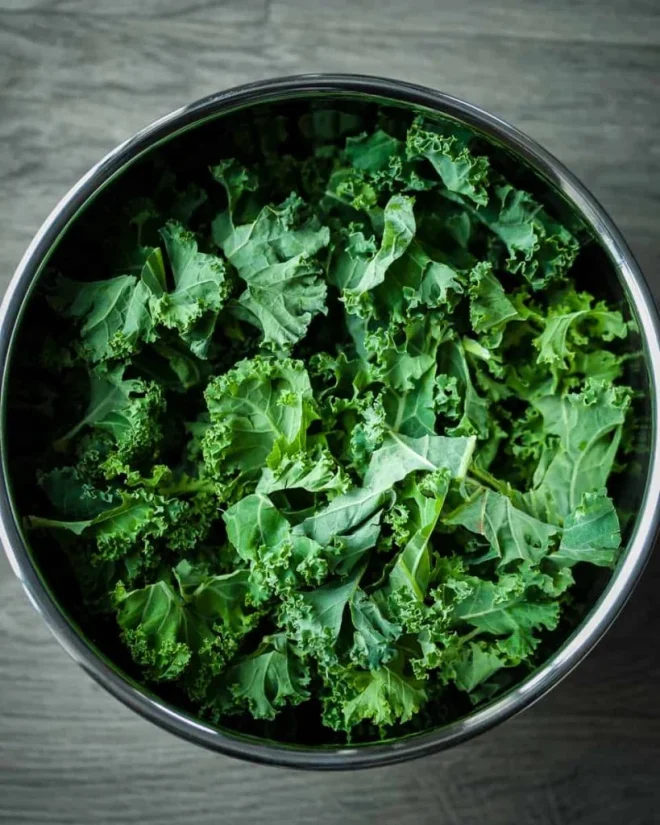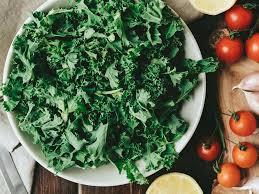
Eat It Raw or Cooked: Learn the Best Ways to Eat Kale
Kale is rich in nutrients like calcium, iron, magnesium, and vitamin C. Learn the healthiest ways to eat kale.
If you haven’t tried greens yet, you should start with kale. Kale is a cruciferous vegetable with large, edible leaves that are usually dark green. Kale is part of the Brassica family, which also includes vegetables like cabbage and cauliflower. This leafy green is very healthy and contains fiber, iron, and vitamins C and K. However, you may have heard that cooking kale is not the best way to preserve its nutritional properties. So, does this mean you should eat it raw? Learn the healthiest way to eat kale and enjoy its benefits.

What are the benefits of eating kale?
Before moving on to this vegetable diet, let’s list some of the benefits of eating kale:
1. Rich in antioxidants
Kale is rich in antioxidants such as flavonoids, polyphenols and beta-carotene, which are important for neutralizing free radicals in the body. Free radicals are unstable products that cause oxidative stress, and have been linked to many health problems such as heart disease, cancer and premature aging.
2. Helps with digestive health
Kale is a vegetable that contains plenty of dietary fiber. According to the USDA, 100 grams of kale contains 4.1 grams of fiber. Fiber helps regulate digestion, prevent constipation and improve overall health by promoting the growth of healthy gut bacteria.
3. Supports heart health
Kale contains potassium, a nutrient known to help control blood pressure, experts say. It also contains omega-3 fatty acids, which can help protect against heart disease and lower cholesterol by reducing inflammation. Therefore, adding green vegetables like kale can be beneficial for heart health.
4. Improve bone health
Eating foods rich in vitamin K may help reduce the risk of osteoporosis, according to a 2017 study published in the Journal of Medicine. In addition to being rich in vitamin K, kale also contains calcium and magnesium. They are essential for supporting healthy bones and preventing bone disease.
5. Strengthen immunity
Kale is rich in vitamin C, which plays an important role in strengthening the body. According to the USDA, 100 grams of kale contains 93.4 milligrams of vitamin C. This vitamin helps produce white blood cells, which strengthen the body and protect it from infections.
6. Helps with weight control
Weight loss is one of the health benefits of kale. In a 2022 study published in the journal Nutrients, 64.5% of participants reported health benefits, the most common of which was weight loss. Low in calories but rich in nutrients, kale is a great choice for anyone trying to maintain their weight. Eating kale can help you lose weight because it contains fiber that fills the stomach, helping people control hunger and not overeat.
What’s the healthiest way to eat kale?
Eating raw kale may help you get most of its nutrients, but it can be tough for your stomach to digest. The tough, fibrous texture of the raw vegetable can be tough to digest and can cause bloating or gas. So there are other ways to eat kale. A 2019 study published in the International Journal of Food Science and Nutrition found that steaming preserves more of the antioxidants and minerals in kale than other cooking methods, such as boiling, microwaving, and pressure cooking. When lightly steamed or sautéed, kale is easy to digest and retains most of its nutrients, including vitamins A, K and fiber.
How to Include Kale in Your Diet?
Here are some ways to include kale in your diet:
- Kale Smoothie – Blend raw kale with banana, mango or berries, yogurt and a little honey or jaggery for a morning smoothie.
- Kale Stir-Fry – Sauté kale with garlic, onion and spices like cumin seeds and turmeric for a quick and healthy vegetable.
- Kale Salad – Massage raw kale with olive oil, lemon and salt, then mix with cucumber, tomatoes, olives and seeds for a salad.
- Kale Chutney – Combine kale with cilantro, mint, green chilies and lemon juice to make a delicious green chutney that pairs well with snacks.
What are the side effects of eating kale?
Eating kale can cause some side effects:
- Goitrogens – Kale, like other cruciferous vegetables, contains goitrogens, which can affect thyroid function when consumed in excess. This is especially a concern for people with hypothyroidism.
- Kidney stones – Kale contains oxalates, which are compounds that can cause kidney stones in people with kidney stones. People with kidney stones should watch their dietary intake or avoid eating too much of it.
- Digestive problems – The high fiber content of raw kale can cause gas, bloating or indigestion, especially in people with stomach problems.
- Allergic Reaction – Some people may be allergic to kale, with symptoms such as swelling and itching.

